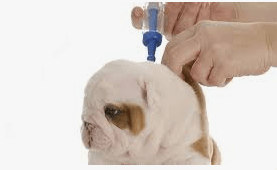Vaccine reactions are very common. Vaccines can be an important component of your dog's health. However, too many vaccines and too soon can cause disease. In fact, it seems that many chronic conditions in dogs seem to be related to vaccination. According to Charles Loops, DVM, "many generations of over-vaccinating animals seem to be bringing out deep, chronic disease syndromes." Repeated vaccination generation after generation is leading to more disease.
These reactions are very common and are also referred to as vaccinosis, which are a set of symptoms that occur after the administration of vaccines immediately or chronically, months or even years later.
Most veterinarians refuse to acknowledge it because they are the ones administering the shots, and administering them frequently. To be clear, vets are NOT to blame here, big Pet Pharma is. Companies like Mars Inc., Nestle Purina and Hill's Science Diet monopolize the entire veterinary business, including most veterinary clinics. Just like any other business, their goal is profit. Not the health of your animal.
Take a closer look at the AKC's recommendation, which is the protocol that most vets follow. As a side note, the AKC is sponsored by Royal Canin, which is a kibble brand that is owned by Mars Inc. If that is not a conflict of interest, I'm not sure what is. Below is the AKC's recommended vaccine schedule:
| Vaccine | AKC Recommended Age |
| Distemper | 6-8 weeks |
| Distemper Booster | 10-12 weeks / 16 - 18 weeks / 12 - 16 months / Every 1 - 2 years |
| Parvo Virus | 6 - 8 weeks |
| Paro Virus Booster | 10 - 12 weeks / 16 - 18 weeks / 12 - 16 months |
| Rabies | 16 - 18 weeks |
| Rabies Booster | 12 - 16 months / Every 1 - 3 years |
| Corona | 12 - 16 months |
| Leptospirosis | 10 - 12 weeks |
| Bordatella | 16 - 18 weeks |
| Giardia | Not specified |
This is a lot of shots for puppies and can overwhelm their immune systems, especially pure-breed. Pure bred dogs come from genetic lines that don't have as much genetic variety compared to mixed breed dogs. This limited genetic variety in addition to the fact that previous generations have been repeatedly vaccinated, creates a predisposition for vaccine reactions.
Additionally, Vaccines are not tailored to meet the individual needs of each breed, purebred or not, which is why a 4lb Yorkie gets the same amount of vaccine as a 100lb Saint Bernard. Vaccines also contain a whole bunch of adjuvants and preservatives to prolong their shelf-life. If you continue to vaccinate each year or every 6 months, or according to how frequently most guidelines dictate, the liver, the main detoxification organ in the body literally becomes bombarded and can no longer function optimally, which creates sickness like allergies, autoimmune disease, cancer etc. The dose determines the poison and ultimately, the more toxins in the body, the more sickness.
Vaccine reactions are very common. Particularly, skin issues, that are often diagnosed as some other disease. The follow skin issues are common vaccinosis symptoms:
- Alopecia
- Calcium formations
- Dermatitis
- Interdigital cysts
- Pyoderma
- Ulcerations
Other vaccine reactions include:
- Appetite issues
- Diarrhea
- Emaciation
- Inflammation
- Inflammatory bowel disease
- Lymphoma
- Pancreatitis
- Runny eyes and conjunctivitis (tear stains in dogs, dry eye, chronic eye allergies)
- Spasms
- Seizures
- Vomiting
- GI lymphoma;

Often these symptoms are recognized as an isolated disease rather than acknowledging the vaccine as the major culprit. Most vets will respond to these symptoms that stem from vaccine by treating with immunosuppressants, assuming the animal has an immune problem. The drugs hide the illness by providing temporary relief, only for symptoms to reappear with a vengeance.
It's not just too many vaccines, it is also the ingredients used to preserve and transport them. Read more on that here.
Vaccine reactions are very common. So if your dog has ever received a vaccine and they have been sick, taking steps to optimize their health is very important. You will want to titer test them and feed a high quality diet.
You want to titer your dog before any additional vaccines are administered to ensure that they truly need it. A titer test is a lab test that measures the presence and quantity of antibodies in the blood to determine immunity to disease. If the sample of blood is positive and above whatever the value of immunity is for each disease, they have protection against the disease. Titer tests are an out-of-pocket expense that is not covered by pet insurance companies, but could save your dog's life especially if they have already received their core vaccines and are a pure-bred.
The thing about vaccines that big pharma won't tell you is that they are literally designed to be effective for 7-15 years. This means they provide your dog with immunity protection he/she will need to remain healthy if confronted withe the major diseases like rabies and distemper. Veterinary immunologist Ronald Schultz, PhD, chair of the Department of Pathobiological Sciences at the University of Wisconsin researched and proved this in the 1970's. His researched measured how long the immunity for the distemper, parvovirus, adenovirus and rabies vaccines last for.
According to his research, once a dog has received initial shots, they will continue to be fully protected without the booster. Dr. Schultz stated, "vaccines for diseases like distemper and canine parvovirus once administered to adult animals, provide lifetime immunity."According to his research, here's the minimum duration of immunity for canine vaccines:
- Distemper – minimum of 7 years and maximum of 15 years
- Parvovirus – minimum of 7 years and maximum of 15 years
- Adenovirus –minimum of 7 years and maximum of 15 years
- Canine rabies – minimum of 3 years and maximum of 7 years
You can read more about his comprehensive research here.
You also want to feed a high quality diet. Click to learn more about our raw food brand recommendations, home-cooked recommendations, supplement recommendations and treat recommendations. You can also earn more about our vaccine recommendations for all dogs excluding bulldogs here and our vaccine recommendations for bulldogs here. If your dog has been vaccinated and ever been sick, please visit Bobzilla's Happy, Healthy Life Made Simple to help your dog optimize his/her health.
Donate to Bobzilla.org

$5.00
The veterinary business is business which is not in the business of curing your animal, but Bobzilla's business is. Bobzilla is committed to one hundred percent transparency in all of its scientific research into animal wellness and prevention of disease and one… read more



